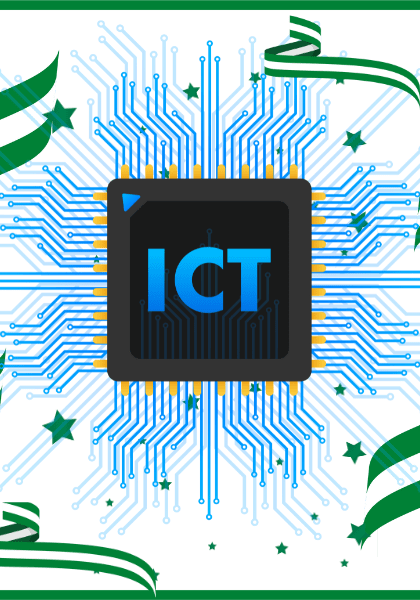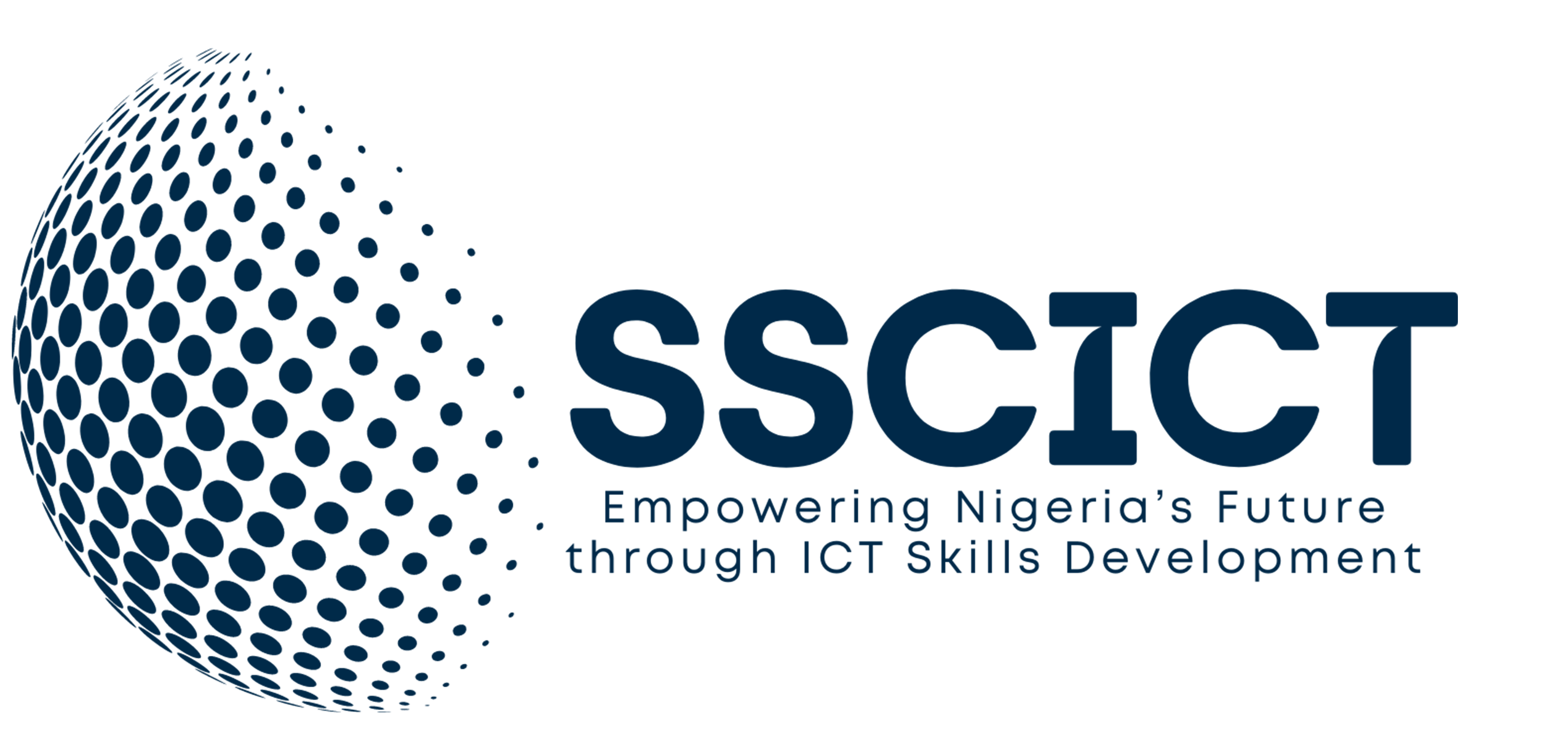Advocacy
How we Do It
At the Sector Skills Council for Information and Communications Technology (SSC ICT), advocacy is at the heart of what we do. As an industry-led organisation, we champion the development and implementation of policies, programs, and initiatives that align ICT training and education with the evolving needs of Nigeria’s economy. Our advocacy efforts focus on ensuring that Nigerian ICT professionals are equipped with the skills necessary to thrive in an increasingly digital and globally competitive environment.
Through our advocacy role, we work closely with government agencies, industry leaders, educational institutions, and international partners to promote ICT skills development at all levels. We also aim to raise public awareness about the importance of bridging the ICT skills gap and ensuring Nigerian learners have access to high-quality, industry-relevant training opportunities.

ICT Skills Policy Reform
We work with policymakers to shape and influence ICT skills development policies that foster innovation and create job opportunities. This includes advocating for adopting National Occupational Standards (NOS) and qualifications frameworks that reflect global best practices
Public Awareness Campaigns
We conduct public awareness campaigns to educate Nigerians on the importance of ICT skills in today’s economy. By highlighting the benefits of ICT training, we encourage learners, educators, and employers to participate in our programs and initiatives.
Collaboration with Stakeholders
SSC ICT actively engages with industry leaders, educational institutions, and government agencies to promote ICT skills development initiatives, such as apprenticeship programs, certifications, and work-based learning opportunities.
Digital Inclusion
As part of our advocacy, we focus on ensuring that all Nigerians, including underrepresented groups like women, youth, and physically challenged individuals, have access to ICT education and training.
SSC ICT as an Advocacy Group
SSC ICT is a powerful advocate for ICT skills development, driving reforms and creating platforms promoting collaboration between industry, government, and educators. Our advocacy efforts are focused on several key areas:
Through advocacy, SSC ICT plays a critical role in shaping the future of ICT in Nigeria and ensuring that the country remains competitive in the global digital economy.

WorldSkills International: New Membership
Nigeria |
In September 2024, Nigeria achieved a significant milestone by being admitted as a member of WorldSkills International, the global body that promotes skills excellence through international competitions. This prestigious membership signifies Nigeria’s commitment to raising the standard of vocational and technical education, particularly in ICT. It aligns the country with global efforts to elevate skills in various industries.

About WorldSkills International
WorldSkills International is a global organisation that supports skills competitions and promotes vocational training across 85 member countries. The body focuses on raising the profile of skilled professionals and inspiring young people to pursue careers in trades, technology, and service industries. Through its international competitions, WorldSkills offers a platform for countries to showcase their best talents and benchmark their skills development strategies against global standards.
Membership in WorldSkills International allows Nigeria to participate in global skills competitions, providing Nigerian youth with the opportunity to demonstrate their technical abilities on a global stage. These competitions also serve as an inspiration for skills development in Nigeria and help align the country’s training programs with international best practices.
WorldSkills Nigeria: A New National Body
As a result of Nigeria’s admission to WorldSkills International, the WorldSkills Nigeria body has been created to manage and promote the country’s participation in WorldSkills activities. WorldSkills Nigeria will oversee the preparation and participation of Nigerian competitors in international skills competitions while also organising national and regional competitions to identify and nurture talent.
By leveraging Nigeria’s membership in WorldSkills International, WorldSkills Nigeria will help raise the bar for skills development across the country, particularly in ICT, where demand for skilled professionals continues to grow.
WorldSkills Nigeria will play a critical role in driving excellence in vocational and technical education, focusing on developing a world-class workforce capable of competing on an international level. Through partnerships with SSC ICT and other sector councils, WorldSkills Nigeria will:
-
 Organise national and regional skills competitions to identify top talent in ICT and other trades.
Organise national and regional skills competitions to identify top talent in ICT and other trades. -
 Develop training programs that align with WorldSkills standards, ensuring that Nigerian participants are equipped to compete at the highest levels.
Develop training programs that align with WorldSkills standards, ensuring that Nigerian participants are equipped to compete at the highest levels. -
 Promote skills development as a viable and prestigious career path for young Nigerians, helping to raise the profile of technical and vocational education.
Promote skills development as a viable and prestigious career path for young Nigerians, helping to raise the profile of technical and vocational education.
SSC ICT and Skills Competitions:
State and Federal Levels in 2025
As part of its advocacy and mission to promote skills development, SSC ICT is proud to announce that it will be organising ICT skills competitions at both the state and federal levels in 2025. These competitions will align with WorldSkills International’s global standards and serve as a platform for identifying Nigeria’s top talent in the ICT sector.
The 2025 ICT Skills Competitions will allow learners, graduates, and professionals to demonstrate their technical skills, creativity, and problem-solving abilities in various ICT disciplines, including software development, cybersecurity, data science, and telecommunications. The competitions will feature challenges designed to test participants’ knowledge, technical proficiency, and ability to work under pressure.
Details of the Competitions
State-Level Competitions
These will be held in major cities across Nigeria, with participants competing in various ICT-related fields. Winners from each state will advance to the national competition
Federal-Level Competitions
The federal-level competitions will bring together the top performers from each state to compete for the national title. The winners of the federal competition will have the opportunity to represent Nigeria in future WorldSkills International competitions.
Categories
Competitions will include software engineering, web development, network administration, cybersecurity, mobile app development, and cloud computing, data analytics and many more.
The full details of the 2025 ICT skills competitions, including eligibility criteria, registration information, and the list of competition categories, will be published before the end of the year.
WorldSkills India
- Focus: WorldSkills India has been successful in integrating technical education into its broader skills development strategy. The country emphasises skill enhancement in sectors such as IT, telecommunications, and robotics. India’s extensive national competitions provide a strong foundation for its success on the global stage.
- Best Practices: India’s strategy includes the active involvement of industry leaders in skills competitions, ensuring that the challenges reflect real-world requirements. SSC ICT will look to emulate this close industry collaboration in organising Nigerian ICT skills competitions.
WorldSkills Canada
- Focus: Canada has built a strong reputation in fields such as ICT and mechatronics. WorldSkills Canada works closely with businesses and educational institutions to ensure that training programs reflect the skills needed by employers.
- Best Practices: Canada’s collaborative approach, which includes partnerships between government, industry, and educational institutions, is a model SSC ICT aims to adopt in organising ICT skills competitions and ensuring the initiative’s sustainability.
Learning from Other WorldSkills Countries
In preparing for these competitions and advancing skills development, SSC ICT is looking to successful WorldSkills member countries for guidance and best practices. Countries such as India, the United Kingdom, Canada, and Australia have established strong national frameworks for skills competitions and vocational education, and their experiences offer valuable insights for Nigeria
WorldSkills Australia
- Focus: WorldSkills Australia excels in organising state and national competitions, with a heavy emphasis on skills in trades, technology, and ICT. Australia’s commitment to vocational excellence is reflected in its success at WorldSkills International competitions.
- Best Practices: Australia’s robust national competition framework includes comprehensive skills training camps that prepare participants for international competitions. SSC ICT will look to introduce similar training camps for Nigerian competitors, ensuring they are equipped with the knowledge and expertise needed to compete at the highest levels.
Conclusion
At SSC ICT, advocacy extends beyond promoting skills development—it encompasses a broader mission of ensuring that Nigeria remains competitive in the global ICT industry.
Through our partnerships with WorldSkills Nigeria and other stakeholders and by organising state and federal-level competitions in 2025, we are committed to raising the profile of ICT skills in Nigeria and developing a world-class workforce.
Stay tuned for more details on our 2025 skills competitions and other initiatives to drive Nigeria’s digital transformation. Together, we can empower the next generation of Nigerian ICT professionals.
